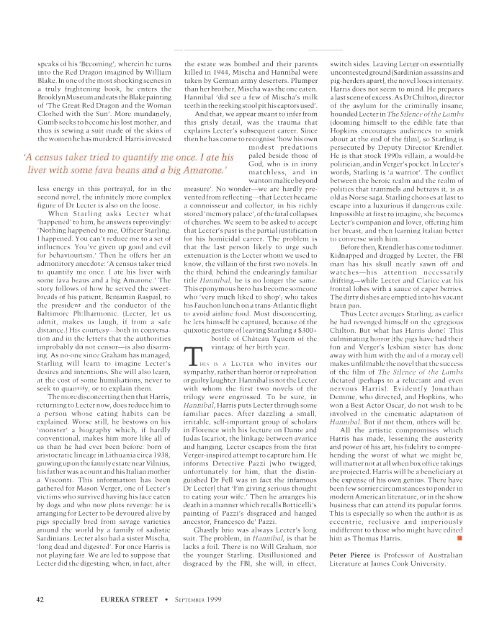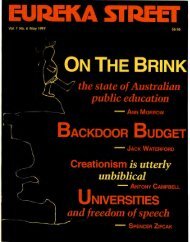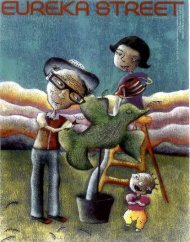1 - Eureka Street
1 - Eureka Street
1 - Eureka Street
- No tags were found...
Create successful ePaper yourself
Turn your PDF publications into a flip-book with our unique Google optimized e-Paper software.
speaks of his 'Becoming', wherein he turnsinto the Red Dragon imagined by WilliamBlake. In one of the most shocking scenes ina truly frightening book, he en ters theBrooklyn Museum and eats the Blake paintingof 'The Great Red Dragon and the Wom anClothed with th e Sun'. More mundanely,Gumb seeks to becom e his lost m other, andth us is sewing a suit m ade of the skins ofthe women he has m urdered. Harris invested'A census tak.er tried to quantify me once. I ate hisliver with some fava beans and a big Amarone.'less energy in this portrayal, for in th esecon d novel, the infinitely m ore com plexfigure of Dr Lecter is also on the loose.When Starling asks Lecter what'happened' to him, he answers reprovingly:'Nothing happened to me, Officer Starling.I happened. You can't reduce m e to a set ofinfluences. You've given up good and evilfor behaviourism.' Then he offers her anadmonitory anecdote: 'A census taker triedto quantify m e once. I ate his liver withsom e fava beans and a big Amarone.' Thestory follows of how he served the sweetbreadsof his patient, Benjam in Raspail, tothe president and the conductor of theBaltimore Philharmonic. (Lecter, let usadmit, makes us laugh, if from a safedistance.) His courtesy-both in conversationand in the letters that the authoritiesimprobably do not censor-is also disarming.As no-one since Graham has managed,Starling will learn to imagine Lecter'sdesires and intentions. She will also learn,at the cost of some humiliations, never toseek to quantify, or to explain them .The more disconcerting then that Harris,returning to Lecter now, does reduce him toa person whose eating h abi ts can beexplained. Worse still, he bestows on his'm onster' a biograph y which, if h ardlyconventional, makes him m ore like all ofus than he had ever been before: born ofaristocratic lineage in Lithuania circa 1938,growing up on the fam ily estate near Vilnius,his fa ther was a count and his Italian mothera Visconti. This inform ation has beengathered for Mason Verger, one of Lecter'svictims who survived having his face eatenby dogs and who now plots revenge: he isarranging for Lecter to be devoured alive bypigs specially bred from savage varietiesaround the world by a fa mily of sadisticSardinians. Lecter also had a sister Mischa,'long dead and digested'. For once Harris isnot playing fair. We are led to suppose thatLecter did the digesting, when, in fact, afterthe estate was bombed and their parentskilled in 1944, Misch a and Hannibal weretaken by German army deserters. Plumperthan her bro th er, Mischa was the one eaten.Hannibal 'did see a few of Mischa's milkteeth in the reeking stool pit his captors used'.And that, we appear m eant to infer fromthis grisly detail, was the trauma thatexplains Lecter's subsequent career. Sincethen he has come to recognise 'how his ownm odest preda tion spaled beside those ofGod, who is in ironym a tchless, and inwanton malice beyondmeasure'. N o wonder- we are hardly preventedfrom reflecting- that Lecter becamea connoisseur and collector, in his richlystored 'memory palace', of the fatal collapsesof churches. We seem to be asked to acceptthat Lecter's past is the partial justificationfor his homicidal career. The problem isthat the last person likely to urge suchextenuation is the Lecter whom we used toknow, the villain of the firs t two novels. Inthe third, behind the endearingly familiartitle Hannibal, h e is no longer the sam e.This eponymous hero has becom e someonewho 'very much liked to shop'; who takeshis Fauchon lunch on a trans-Atlantic flightto avoid airline food. Most disconcerting,he lets himself be captured, because of thequixotic gesture of leaving Starling a $300+bottle of Ch ateau Yquem of the']1 vintage of her birth year..1. HI S I S A LECTER wh o invites ou rsympathy, rather than horror or reprobationor guilty laughter. Hannibal is not the Lecterwith whom the first two novels of thetrilogy were engrossed. To be sure, inHannibal, Harris puts Lecter through som efamiliar paces. After dazzling a sm all,irritable, self-important group of scholarsin Florence with his lecture on Dan te andJudas Iscariot, the linkage between avariceand hanging, Lecter escapes from the firstVerger-i nspired attem.pt to capture him. Heinform s Detective Pazzi (who t wigged,unfortunately for him, that th e distinguished Dr Fell was in fact the infam ousDr Lecter) that 'I'm giving serious thoughtto eating your wife.' Th en he arranges hisdeath in a m anner which recalls Botticelli'spainting of Pazzi's disgraced an d hangedancestor, Francesco de' Pazzi.Ghastly brio was always Lecter's longsuit. The problem, in Hannibal, is that helacks a fo il. There is n o Will Graham, northe younger Starling. Disillusioned anddisgraced by the FBI, she will, in effect,switch sides. Leaving Lecter on essentiallyuncontested ground (Sardinian assassins andpig-herders apart), the novel loses in tensity.Harris does not seem to mind. He preparesa last scene of excess. As Dr Chilton, directorof the asylum for the crim inally insane,hounded Lecter in The Silence of the Lambs(dooming himself to the edible fa te thatHopkins encourages audiences to smirkabou t at the end of the film ), so Starling ispersecuted by Depu ty Director Krendler.He is that stock 1990s villain, a would-bepolitician, and in Verger's pocket. In Lecter'swords, Starling is 'a warrior'. The conflictbetween the heroic realm and the realm ofpolitics that trammels and betrays it, is asold as N orse saga. Starling chooses at last toescape into a luxurious if dangerous exile.Impossible at first to imagine, she becomesLecter's companion and lover, offering himher breast, and then learning Italian betterto converse with him.Before then, Krendler has come to dinner.Kidnapped and drugged by Lecter, the FBIman has his skull neatly sawn off andwatches-h is a t tention necessarilydrifting-while Lecter and Clarice eat hisfron tal lobes with a sauce of caper berries.The dirty dishes are emptied into his vacantbrain pan.Thus Lecter avenges Starling, as earlierhe had revenged himself on the egregiousChilton. But what has Harris done? Thisculminating horror (the pigs have had theirfu n and Verger's lesbian sister has doneaway with him with the aid of a moray eel)makes unfilm able the novel that the successof the fi lm of The Silence of the Lambsdictated (perhaps to a reluctant and evennervous H arris). Evidently JonathanDemme, who directed, and Hopkins, whowon a Best Actor Oscar, do not wish to beinvolved in the cinem atic adaptation ofHannibal. But if not them , others will be.All the artistic compromises whichHarris has made, lessening the austerityand power of his art, his fidelity to comprehendingth e worst of what we might be,will m atter not at all when box office takingsare projected. Harris will be a beneficiary atthe expense of his own genius. There havebeen few sorrier circumstances to ponder inmodern American literature, or in the showbusiness that can attend its popular forms.This is especially so wh en the author is aseccentric, reclusive and imperiouslyindifferent to those who might have editedhim as Thomas Harris.•Peter Pierce is Professor of Au stralianLiterature at James Cook University.42 EUREKA STREET • SEPTEMBER 1999
















